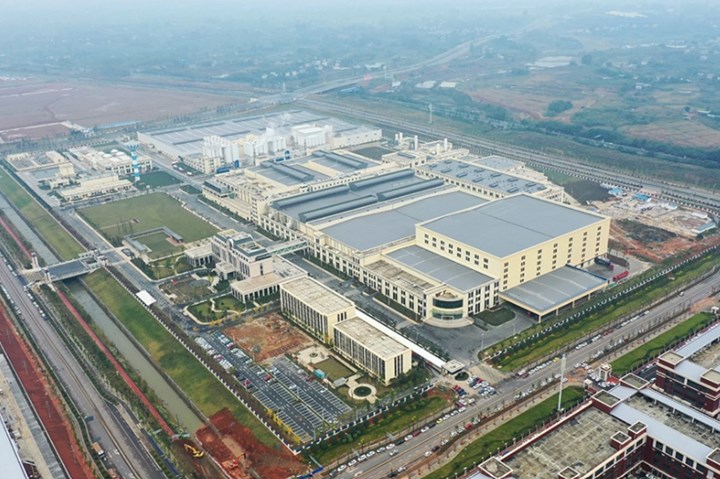Jushi 250,000-ton glass fiber facility begins operation
Base production lines surpass production expectations, setting a new benchmark for intelligent manufacturing in the glass fiber industry.

Photo Credit: China Jushi
Twenty months after the start of the construction work in March 2019, the official opening of fiberglass manufacturer China Jushi Co. Ltd.’s (Hangzhou, China) 250,000-ton glass fiber manufacturing facility was held in the Qingbaijiang District, Chengdu, Sichuan province on Nov. 18.
China Jushi and China National Building Material Group (CNBM, Beijing, China) executives, as well as leaders of various departments of the district government, customer representatives, supplier representatives, news media and employee representatives attended the ceremony.
In his inaugural speech, Wang Yumeng, deputy general manager of CNBM, the parent company of China Jushi, affirmed that CNBM will continue to spare no effort to support the development of China Jushi. He expressed hope that local governments at all levels, especially the Chengdu Municipal Party Committee and the Qingbaijiang District, can continue to support the development of both groups, and jointly carry forward the business of new glass fiber materials.
For its part, Yang Guoming, president of Jushi Group, says that Jushi Chengdu represents the industry's highest level of intelligence, using the best energy-saving and environmental protection technology. “This is the world's leading high-performance glass fiber manufacturing base,” he asserts. “Since the two production lines were put into operation, various economic and technical indicators have greatly exceeded expectations. In particular, the second production line took the lead as soon as it was put into operation. It refreshed China Jushi’s fastest and best production record in reaching production standards, fully reflecting high efficiency and setting a new benchmark for intelligent manufacturing in the glass fiber industry.”
Related Content
-
Watch: A practical view of sustainability in composites product development
Markus Beer of Forward Engineering addresses definitions of sustainability, how to approach sustainability goals, the role of life cycle analysis (LCA) and social, environmental and governmental driving forces. Watch his “CW Tech Days: Sustainability” presentation.
-
Partners recycle A350 composite production waste into adjustable-length rods for MFFD
Herone, Spiral RTC, Teijin Carbon Europe and Collins Aerospace Almere recycle A350 thermoplastic composite clips/cleats waste into rods for the all-thermoplastic composite Multifunctional Fuselage Demonstrator’s crown.
-
Plant tour: Hexagon Purus, Kassel, Germany
Fully automated, Industry 4.0 line for hydrogen pressure vessels advances efficiency and versatility in small footprint for next-gen, sustainable composites production.






